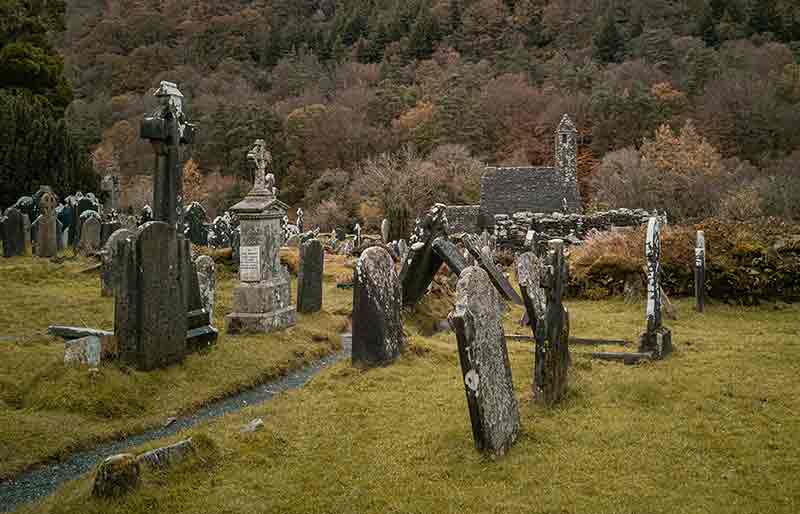Glendalough

Nestled amidst the tranquil beauty of Glendalough's monastic site, a rectangular slab known as "Arthur's Stone" quietly rests near St. Kevin's Church. While its connection to the legendary king is purely speculative, the stone's presence serves as a fascinating testament to the intertwining of Celtic traditions, local folklore, and cinematic influence.
The stone itself, estimated to date back to the early medieval period, bears intriguing markings: cup marks, common on ancient monuments, and enigmatic ogham inscriptions awaiting decipherment. While its origins and purpose remain shrouded in mystery, the name "Arthur's Stone" whispers a connection to a much beloved legend.
Though lacking historical evidence, the name likely stems from later associations with the popular Arthurian narratives. Perhaps early Christian missionaries employed the name to bridge the gap between their teachings and the local Celtic tradition, weaving familiar figures into their message. Regardless of its origin, the name has fueled local folklore, attributing healing powers and prophetic dreams to those who sleep upon the stone.
While Glendalough's monastic settlement predates the traditional Arthurian period, its remote location and spiritual significance have drawn later legends and associations. Whispers of Arthur seeking refuge or healing here likely arose from the site's reputation as a center of pilgrimage and learning. The surrounding Wicklow Mountains also appear in Arthurian folklore, hinting at a deeper connection that transcends historical timelines.
The 1981 film "Excalibur" solidified Glendalough's cinematic link to the Arthurian legend, but it's important to remember that this portrayal remains firmly within the realm of fiction. Nonetheless, the film's imagery has added another layer to the tapestry of stories woven around Arthur's Stone.
Ultimately, the legend of Arthur's connection to Glendalough remains an enigmatic whisper, one that invites exploration and interpretation. The stone itself stands as a tangible link to the past, its markings hinting at ancient practices and beliefs. Its evocative name, local folklore, and cinematic association paint a richer picture, reminding us that history, legend, and storytelling often intertwine, creating narratives that endure across time and place. So, while the truth surrounding Arthur's Stone may forever remain veiled, its presence at Glendalough serves as a reminder that even the smallest whispers can resonate, enriching our understanding of the past and inspiring our imaginations.
Arthurian Legend Summarised
Glendalough
Site predates Arthurian period (5th-6th centuries) but spiritual significance fueled later legends
Tales of Arthur seeking refuge or healing here
King Arthur's Stone, St. Kevin's Church
The name "Arthur's Stone" is likely a later addition, no historical link to King Arthur
May have originated from Christian missionaries adapting legends
Local folklore attributes healing powers and prophetic dreams
Location
Glendalough is situated in a dramatic glacial valley in County Wicklow, Ireland. The Glendalough Valley is located in the Wicklow Mountains National Park.
Key Geographic Facts
Coordinates: Approximately 53°00′37″N and 6°19′39″W.
Region: Leinster (Wicklow Mountains).
Landscape: It is defined by two deep lakes (Lower and Upper Lake) carved by glaciers, surrounded by steep oak forests and the granite peaks of the Wicklow Mountains National Park.
Proximity to Major Cities:
Dublin: Roughly 30 miles (48 km) to the north.
Kilkenny: Approximately 60 miles (96 km) to the southwest.
Major Road: The valley is accessed via the R756, which traverses the scenic Wicklow Gap, and is located a short drive from the N11 dual carriageway connecting Dublin to the southeast coast.
Useful Links
Wicklow Mountains National Park (Opens in new window) Offers diverse outdoor activities, including hiking the iconic Wicklow Way and exploring the ancient monastic city of Glendalough. The park features scenic drives, birdwatching, and cycling trails, supported by visitor services such as guided tours and educational programs focused on Irish conservation.

